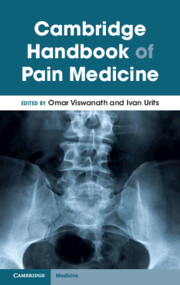Book contents
- Cambridge Handbook of Pain Medicine
- Cambridge Handbook of Pain Medicine
- Copyright page
- Contents
- Contributors
- Pain Handbook Introduction
- Part I Introduction to Pain: Pain Signaling Pathways
- Part II Common Categories of Pharmacologic Medications to Treat Chronic Pain
- Part III Chronic Pain Conditions Head and Neck
- Part IV Spine
- Part V Extremities
- Part VI Misc
- Chapter 26 Post-herpetic Neuralgia (PHN)
- Chapter 27 Complex Regional Pain Syndrome (CRPS)
- Chapter 28 Sickle Cell Disease
- Chapter 29 Breast Pain
- Chapter 30 Post-thoracotomy Pain
- Chapter 31 Multiple Sclerosis Pain
- Chapter 32 Cerebral Palsy
- Chapter 33 Myofascial Pain Syndrome
- Chapter 34 Post-stroke Pain
- Chapter 35 Chronic Abdominal Pain
- Chapter 36 Chronic Pelvic Pain
- Chapter 37 Postsurgical Nerve Entrapment
- Chapter 38 Cancer Pain
- Part VII Adjunctive Therapy
- Index
- References
Chapter 36 - Chronic Pelvic Pain
from Part VI - Misc
Published online by Cambridge University Press: 01 December 2023
- Cambridge Handbook of Pain Medicine
- Cambridge Handbook of Pain Medicine
- Copyright page
- Contents
- Contributors
- Pain Handbook Introduction
- Part I Introduction to Pain: Pain Signaling Pathways
- Part II Common Categories of Pharmacologic Medications to Treat Chronic Pain
- Part III Chronic Pain Conditions Head and Neck
- Part IV Spine
- Part V Extremities
- Part VI Misc
- Chapter 26 Post-herpetic Neuralgia (PHN)
- Chapter 27 Complex Regional Pain Syndrome (CRPS)
- Chapter 28 Sickle Cell Disease
- Chapter 29 Breast Pain
- Chapter 30 Post-thoracotomy Pain
- Chapter 31 Multiple Sclerosis Pain
- Chapter 32 Cerebral Palsy
- Chapter 33 Myofascial Pain Syndrome
- Chapter 34 Post-stroke Pain
- Chapter 35 Chronic Abdominal Pain
- Chapter 36 Chronic Pelvic Pain
- Chapter 37 Postsurgical Nerve Entrapment
- Chapter 38 Cancer Pain
- Part VII Adjunctive Therapy
- Index
- References
Summary
Chronic pelvic pain lasting over six months and not related to menstrual cycle is a condition experienced by women, and there are numerous causes, including gynecologic, urologic, gastrointestinal, musculoskeletal, neurologic, and psychological factors. Women who have suffered sexual, physical, or emotional trauma are at a higher risk of developing chronic pelvic pain, and they also have higher rates of psychological disorders than their peers. Men, on the other hand, commonly experience chronic pelvic pain due to chronic prostatitis and may also have psychological disorders. There are various treatment options, such as surgery, medication, and nonpharmacological therapies, including alternative therapies. Cognitive-behavioral therapy is an additional treatment option that should be considered when treating chronic pelvic pain syndrome.
- Type
- Chapter
- Information
- Cambridge Handbook of Pain Medicine , pp. 295 - 302Publisher: Cambridge University PressPrint publication year: 2023

